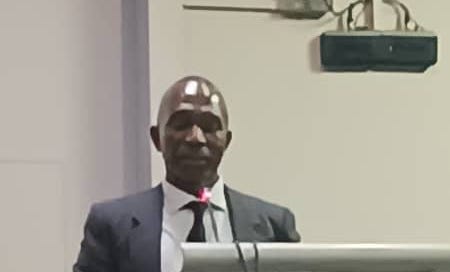Malawi's SADC National Committee Aims to Drive Regional Integration Amid Challenges, Official Says
As Malawi continues to navigate its responsibilities within SADC, the involvement of both state and non-state actors will be critical in driving the successful implementation of regional initiatives.
HARARE, Zimbabwe – Malawi’s SADC National Committee (SNC) is playing a crucial role in steering regional integration efforts but faces significant challenges that could hamper its effectiveness, said Paul Lupiya, a Foreign Service Officer from Malawi’s Ministry of Foreign Affairs, writes Winston Mwale.
Lupiya delivered his remarks during the 4th Regional Dialogue for Non-State Actors on the SADC Regional Indicative Strategic Development Plan (RISDP) 2020-2030, held both in-person and virtually at Cresta Lodge in Harare, Zimbabwe, on August 14-15.
Lupiya highlighted that Malawi's SNC, which was established in 2016 and re-launched in 2021 by President Lazarus Chakwera, is key to ensuring that Malawi meets its obligations under the SADC Treaty.
The committee is designed to be the central hub for collaboration between the public sector, private sector, civil society, and development partners, serving as the primary interface between the Government of Malawi and the SADC Secretariat.
“The SADC National Committee is mandated to provide inputs in the formulation of SADC policies, strategies, and programs of action,” Lupiya explained.
“It is also responsible for coordinating and overseeing the implementation of these programs, ensuring that Summit and Council decisions are effectively interpreted and executed at the national level.”
### **Mandates and Structure of Malawi’s SNC**
Lupiya elaborated on the structure and responsibilities of the SNC, noting that the committee is required to meet at least quarterly.
Among its key duties are initiating projects, overseeing the implementation of SADC programs, and ensuring the coordination of various national SADC implementing institutions and cluster sub-committees.
“The National Steering Committee, which operates under the SNC, is mandated to meet bi-monthly with a quorum of 50% to ensure the participation of all sub-committee chairpersons,” Lupiya said.
“This committee is crucial for the rapid implementation of programs, especially those that require urgent attention from the SADC Secretariat.”
The SNC also includes Technical Sub-Committees that meet bi-monthly to oversee the core areas of regional integration.
These sub-committees are tasked with generating baseline assessment reports and ensuring the implementation of activities in line with SADC’s objectives.
Lupiya emphasized the role of the SNC Secretariat, which supports the operation of the SNC by providing coordination and administrative support, convening meetings, and raising public awareness about SADC’s regional integration agenda.
“The Secretariat is structured according to the core areas of integration outlined in the SADC Treaty,” Lupiya explained.
“It is responsible for collating information from sub-committees, transmitting reports to the SADC Secretariat, and raising visibility of SADC’s efforts among the general public.”
Deliverables and Future Plans
Since its re-launch, Malawi’s SNC has undertaken several key activities, including the orientation of SNC sub-committee members, conducting a RISDP costing exercise, and securing funding for the Change Project Phase 2.
Lupiya outlined several planned activities, such as orienting technical sub-committees, training on monitoring and evaluation of RISDP implementation, and holding frequent quarterly meetings.
“We are also looking to benchmark Malawi’s SNC with high-performing SNCs in the region,” Lupiya said, underscoring the need to learn from other countries’ experiences to enhance the committee’s effectiveness.
Challenges Facing Malawi’s SNC
Despite the progress made, Lupiya candidly addressed the challenges that have hindered the full operation of Malawi’s SNC.
The committee is currently operating with a skeleton staff, a situation exacerbated by numerous vacancies within the Ministry of Foreign Affairs, particularly in the SADC unit that serves as the SNC Secretariat.
“This shortage of personnel has severely impacted our ability to coordinate national SNC structures effectively, plan and budget, and monitor and evaluate RISDP projects,” Lupiya stated.
“It has also led to inadequate participation from key stakeholders, such as the youth and private sector, in the implementation of the SADC integration agenda.”
Additionally, the SNC is grappling with a lack of office facilities, such as motor vehicles and ICT equipment, as well as a shortage of Information, Educational, and Communication (IEC) materials.
These deficiencies have limited the SNC’s ability to conduct dissemination campaigns about the SADC agenda and to raise grassroots awareness of the benefits of belonging to the SADC community.
“The lack of resources has resulted in low appreciation at the grassroots level of what it means to be part of the SADC family,” Lupiya said.
The Role of Non-State Actors and Call for Collaboration
Lupiya also highlighted the importance of non-state actors (NSAs) in promoting the SADC agenda and urged for their continued collaboration with the government.
He acknowledged the crucial role that NSAs have played in implementing the RISDP 2020-2030 and called for expanded support from these groups.
“The Government of Malawi recognizes the vital role that non-state actors play in promoting the SADC agenda,” Lupiya said.
“We wish to see NSAs expand their collaboration with the government, particularly in supporting the funding of annual activities of the Malawi SNC and boosting the resource base of the SNC Secretariat.”
Lupiya concluded by expressing hope that continued initiatives like the current dialogue would strengthen the collaboration between the government and NSAs, helping to overcome the challenges currently faced by the SNC.
“As we move forward, it is crucial that we address these challenges head-on, with the support of all stakeholders, to ensure that Malawi can fully participate in and benefit from the SADC integration agenda,” Lupiya said.
The dialogue underscored the significant role that Malawi’s SNC plays in regional integration efforts, while also highlighting the pressing need for increased resources and collaboration to overcome existing challenges.
As Malawi continues to navigate its responsibilities within SADC, the involvement of both state and non-state actors will be critical in driving the successful implementation of regional initiatives.




